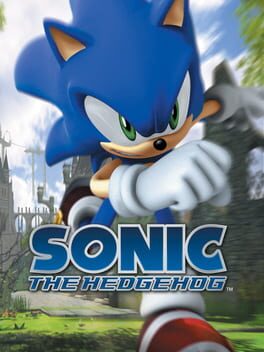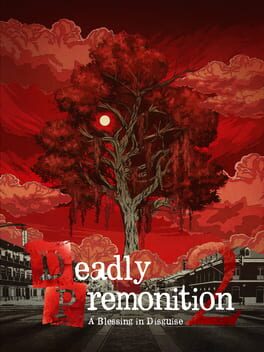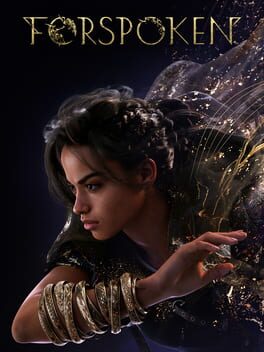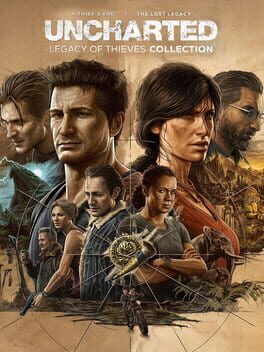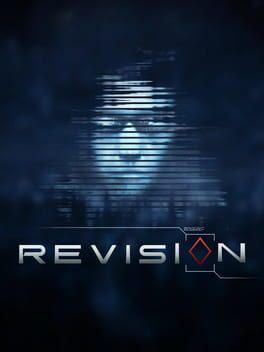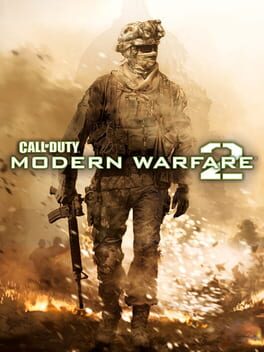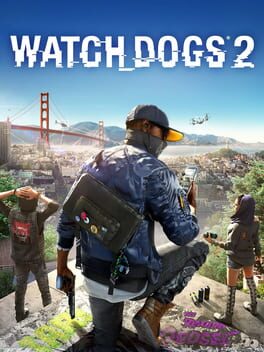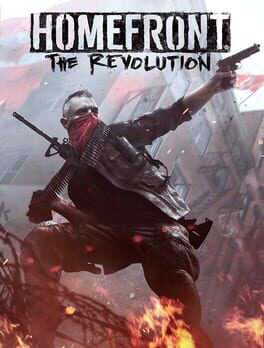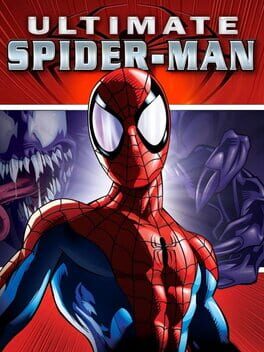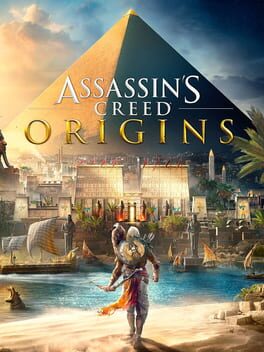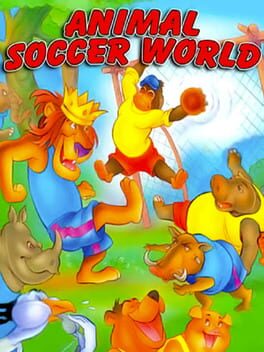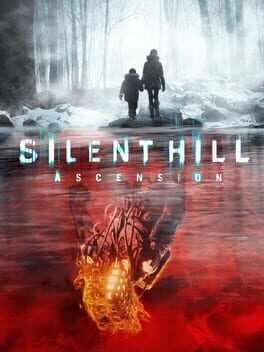Seinfelddahog
78 Reviews liked by Seinfelddahog
NBA 2K16
2015
Sonic the Hedgehog
2006
Awful and essentially unplayable.
Such a shame that Deadly Premonition revisionism is so entrenched that even the creators thought being a technical shambles was “part of the charm” - the 360 original ran perfectly fine and was fantastic because of its ambition & heart despite its budget and technical shortcomings.
This? A cynical 10 frame a second travesty.
Avoid
Such a shame that Deadly Premonition revisionism is so entrenched that even the creators thought being a technical shambles was “part of the charm” - the 360 original ran perfectly fine and was fantastic because of its ambition & heart despite its budget and technical shortcomings.
This? A cynical 10 frame a second travesty.
Avoid
Alan Wake II
2023
Forspoken
2023
Deus Ex: Revision
2015
i don't even think games like 50 Cent: Blood on the Sand and Metal Gear Rising Revengeance are half as insane as this simply because this actually cost a lot of money. they spent $200m on marketing a game where you massacre civilians in an airport about two hours in; a game where you receive quotes from, among others, Confucius and Dick Cheney on your death screen; a game that climaxes with the protagonist wrenching a knife out of their gut to throw at the bad guy.
replaying this for the first time in maybe a decade and just mouth agape through the whole thing. it's not a good game. but i kinda love it. played the campaign so much as a teenager listening to Metallica's Death Magnetic that the whole thing feels glued to my being. it's a problematic fave. i'll go the grave loving it, knowing full well i am going to hell for doing so.
replaying this for the first time in maybe a decade and just mouth agape through the whole thing. it's not a good game. but i kinda love it. played the campaign so much as a teenager listening to Metallica's Death Magnetic that the whole thing feels glued to my being. it's a problematic fave. i'll go the grave loving it, knowing full well i am going to hell for doing so.
Watch Dogs 2
2016
Saw this tweet and it made me immediately think of this game. It's one of my favorite open world games ever, easily the best thing Ubisoft made in the last 15 years, and the story and vibes always stuck to me as a fantasy that I wished was truly real, haha.
Watch Dogs 2
2016
This game oozes personality like no other. The open world really feels like a world, unlike a checklist simulator. Everyone in here feels alive, from the protagonists to the people on the streets.
The gameplay, though just a simple tps, can get pretty deep if you decide to make a "no kill" run (I recommend the maximum difficulty, it's amazingly fair).
An actual example of Cyberpunk in the modern age, Watch Dogs 2 really lodges into your heart if you give it an opportunity
The gameplay, though just a simple tps, can get pretty deep if you decide to make a "no kill" run (I recommend the maximum difficulty, it's amazingly fair).
An actual example of Cyberpunk in the modern age, Watch Dogs 2 really lodges into your heart if you give it an opportunity
[Sorry this is a bit late]
Homefront: The Revolution gets way more fucking hate than it deserves. Given the amount of people who are likely gonna play through it just so they can play Timesplitters again, I feel it's my duty to defend the game from those who are going to hate on it for being something that it isn't, as well those who accused it of being something worse than it is.
It is NOT a Far Cry game even though it shares design elements with the series. It is NOT a AAA game even though it looks like one. It is definitely NOT a piece of imperialist propaganda about how Koreans are bad. It absolutely is NOT a Timesplitters game in any way, shape, form, or reason. And I can assure that it’s neither a Call of Duty nor Crysis game.
Homefront: The Revolution is a rugged, semi-open world game about being a guerrilla fighter for a revolution. It was developed by a medium-sized team on a medium sized budget, and it shows. It may not be a particularly polished game, and yes, there is a fair bit of jank throughout the whole thing, but that's something to be expected from a game of this scale built across such a tumultuous development cycle (we'll get to this a little later).
There are 3 different types of maps that all have slightly different styles of gameplay. Green Zones are linear set pieces, Yellow Zones are smaller-scale ghettos, and Red Zones are effectively like war zones. The set pieces might be where the game is at its weakest because the mechanics themselves are not exactly designed for that kind of gameplay. The enemy AI is not all that great and the stealth is kinda lacklustre, as well. The Red Zones are home to the more action oriented gameplay, where you’ve gotta defend ally outposts, liberate enemy outposts, and try not to get spotted by the evil, flying zeppelins. The Yellow Zones are perhaps the most interesting part of the game, though, because you are tasked with leading an uprising against the ‘oppressive regime’ in urban districts by convincing the citizens to riot against the KPA. You are initially pushed to take a subtler, more stealth-based approach in order to raise the citizens’ hearts and minds enough for them to vandalise the streets. It’s not that easy for me to explain how this works, but a lot of the time, it genuinely feels like you are responsible for a social movement in which you and the people of the district take back your streets from the oppressors. It is super interesting stuff. There are many different types of gameplay crammed into this whole package, and as such, the missions often feel a bit repetitive since they typically resort to czechlist-based design. Y’know, liberate this many outposts, defend against that many enemies, strip these many posters off the walls; that type of stuff. Ironically enough, I’m not saying that this type of design is anything revolutionary, despite the nature of the game it’s in, but it is often very solid in terms of its execution, especially in the Yellow Zones.
Homefront: The Revolution also has a really interesting weapon customisation system that’s similar to the ones found in the Crysis franchise. You can change your various weapon parts in order to gain different abilities from them. For just about every weapon, you can modify the grip, fire rate, ammo type, ironsight, and more things that I’m probably forgetting because it’s been over 2 years since I’ve played it and my memory is probably failing me. What I do remember is that it made the gunplay feel quite tactile and variable in a way that I haven’t seen in all that many games. It’s actually surprisingly well done for what it is.
On the topic of weapons, I feel that it’s necessary to talk about the gunplay itself in a little more detail because it’s one of the more misunderstood aspects of the game. As I said before, this is a game where you play as a guerilla fighter in the midst of a revolution. You are not a soldier. You are not a marksman. You aren’t a trained fighter. Hell, your character probably hasn’t even used a gun outside of the first moments of the game. You are merely someone who is fighting for a cause that they believe in, and this is reflected through the kinesthetics of the game.
Weapons aren’t precise like in Call of Duty or TimeSplitters, they are unwieldy and cumbersome to use. Guns have a ridiculous amount of recoil and bullet spread that may turn some players off from the game. You are underpowered compared to the KPA around you, and can only take a few shots before dying since they have stronger weapons than you do. However, they also wear bulletproof vests and body armour that can withstand a lot of your shots, especially on higher difficulties. If you look at the KPA’s weapons, you’ll notice that they are futuristic machines built with aerodynamic angles at mechanical precision, whereas your weapons are essentially just a bunch of worn-down, rusty parts that are clumsily held together with tape and rubber bands. The individual parts clash with each other in every way except for their ‘battle scars’ and, especially towards the beginning of the game, they reload rather slowly, too. Handling them is opposite of refined, but once you get used to them, they certainly pack a punch and a half. These barely held together pieces of machinery rattle and clamber with every shot, and keychains with faded flags on them violently jostle with every movement. Yes, the weapons feel cumbersome to use, especially at the beginning, but that’s the point. You are part of a revolution, you are fighting for what you believe in. You are not fighting because you can, but rather because you have to. Your weapons are as strong as your will to use them.
The gunplay progresses in parallel to the revolution. You start out fighting with what you’re given, and you end up fighting with what you’ve got. At the beginning, you’re shooting bullets from a clumsy shotgun, but towards the end, you’re shooting fireworks into crowds of KPA-gents. Sure, those fireworks are needlessly bombastic and overly celebratory and excessively patriotic. They’re honestly quite silly, but that doesn’t matter because they are effective nonetheless. When your voice has been suppressed, it doesn’t matter how stupid you look or sound. I mean, if your voice was taken, what would you do to get it back?
I know I’m starting to preach, but it’s because it genuinely makes me upset that people point at this game’s cutscenes and writing and laugh it off as just another shitty video game story with nothing going for it. I won’t deny that the writing is not all that great in the grand scheme of things, but the stuff that’s there says more about the topic at hand than basically any other game I’ve seen or heard of, let alone played. There are plenty of games that have ‘guerilla fighting’ and ‘revolutions’ in them (Just Cause 3, Far Cry 3-5, Watch Dogs 2, 1979 Revolution: Black Friday), but frankly, they aren’t terribly well-written either. It’s frustrating that Homefront: The Revolution’s introduction is as poor as it is, because when you stop laughing at how it initially “sounds” and listen to what it actually “says” beyond the introductory cutscenes, there is genuinely quite a lot of content to unpack. In fact, I’d argue that Homefront: The Revolution explores the very concept of revolutions and examines why people take part in them much more than most other games. Why does a pacifist take part in a war, what do people gain by joining an opposing force, at what point does violence detract from a movement-- these are just some of the questions and topics that are brought to light when you play through it. You will find notes from individuals who became KPA-gents discussing why they joined the force. You will learn the effects that an oppressive regime has on different people, as well as how they deal with it. You will learn the consequences of being part of the revolution. There is a lot to learn and read and listen to and see, and no, it’s not particularly subtle about any of it, but it’s absolutely not shallow in terms of its narrative and thematic content. I mean, tell me another game that actively explores the concept of revolutions to the extent that this one does. (Actually, don’t do that because then it’ll be yet another game on my seemingly endless backlog and I’ll feel fuckin terrible about myself lol.)
Even if you don’t like the writing itself, if you just look at the game, you will see that the environments tell more stories than any of the cutscenes or dialogue possibly can. You will walk through the battered remains of a city scarred by an invasive force. You will venture through the sickly result of a chemical atrocity. You will see slums filled with trash constricted by giant, cement walls that are plastered with propaganda and retaliatory graffiti. As you walk through city streets infested with the bright red screens and fluorescent lights of the KPA, you might notice that trash from the alleys has seeped into the pavement. Military fortresses invade the streets like tumours, and yet sofas sit in front of them in silent protest. The more thoroughly you observe the maps, the more you are rewarded with silent stories. Those aforementioned sofas may present an interesting vignette, but if you carefully observe the alleys in prior yellow zones and notice the tired civilians sitting on similar-looking couches in their garages, that simple piece of furniture becomes a narrative device that exemplifies the growing tensions between the people on the streets and those in power. All the nuance that is missing from the written story is more than prevalent in the world. I’m not just talking about the graffiti and propaganda, but rather the city beneath it. The sofa is just one example that I happen to remember; but these kinds of subtle stories are everywhere in Homefront: The Revolution.
Rather than discussing and breaking down more of those moments, though, I feel that it’s necessary to address something at the surface. Just because the “enemy” in this fictional game is Korea and the “protagonist” is the “US”, does not make this a statement against Korea and/or for the US. It is NOT a piece of imperialist propaganda, it is a story about taking part in a revolution and the effect it has on the people involved. The primary reason that Korea and the US are in this game is because their conflict is the remnant of the previous one in the franchise it softly rebooted. The KPA happens to be an oppressive force, and the revolutionists happen to be American, but these roles could’ve been filled by anyone and the narrative would be virtually identical. Hell, the roles could be switched around and it’ll still convey THE SAME THING. The game criticises both parties. Yes, it could be more critical of them, and yes, it sometimes conveys some dissonant messages--especially in its ending sequence--, but I’d argue that the game does NOT choose explicit heroes or villains, even if it may seem like it from the surface. Of course, this doesn’t invalidate the possibility that some of the creative choices were sensationalistic in nature, but that doesn’t make it a work of propaganda, let alone imperialist.
I know I’ve stressed it a lot, but this is a game about revolutions through and through. It’s about the costs and benefits of fighting against overwhelming odds for something you truly believe in. Even the game’s development parallels its subject matter. You see, it can be argued that Homefront: The Revolution is essentially the product of metaphorical guerilla fighters. Over the course of its 5 year development cycle, both the team and the game itself lived through the closure of two studios, the bankruptcy of their original publisher, the financial mismanagement of their second publisher, the ruthless deadlines of their third publisher, and the fluctuation in both size and scale of the game and its dev team. What started out as a simple, linear follow up to the first Homefront became a full open-world game, yet partway through its already troubled development, over ⅓ of the team had to leave the studio because the publisher wasn’t paying them. Several other devs--including the director himself-- quite literally went on strike after being denied the pay they were rightfully promised. Even after the studio was bought out and rebranded, and the devs were getting paid again, they were still making the same game at the same scale as before, but with ⅔ of the people they had before. It was already an ambitious game for a team of roughly 150 people to make, but then only 100 people had to take on that same workload across the same time. Yes, corners had to be cut; it’s no longer a full open world game, but even after a delay of almost an entire year, Homefront: The Revolution launched in an unplayable, unfinished state, and was bombed by both critics and consumers.
As of now, the game has a metascore of 49. Pretty much everyone hated the game. Both Dambuster Studio and Deep Silver had every reason to quit, but they didn’t. They spent the following year fixing the game, removing the vast majority of the game breaking bugs. Obviously, they missed a few of them, but enough of them were fixed to make the game playable, and they didn’t stop there. 2 expansions were released--I didn’t play either of them, but I’ve heard that they’re even better than the base game. The devs even added in a fully featured co-op mode with its own story and missions and support for up to 4 players.
I’m not saying that Homefront: The Revolution is this perfect, brilliant game that everyone must play. What I am saying is that the developers quite literally lived through the events of this game, they literally protested for it. Even though it was at the brink of extinction for years, it exists because the people who made it genuinely believed in the project. Homefront: The Revolution is the product of passionate developers who put nearly 6 years of work into something they truly cared about.
I’ve read comments from people who have proclaimed that Homefront: The Revolution would’ve been a hit if it were made by a different developer. This is just not the case. No other developer would’ve believed in the project nearly as much as Dambuster, and no other developer could’ve made this game. When you look at the world that the team has managed to create, the amount of thought and care that has gone into realising even its smallest details is nothing short of inspiring. . In some way that I cannot properly articulate, I believe in everything this game shows me. There is an unquestionable sincerity and genuineness that emanates from its every pixel. Sure, some of its aspects are poorly executed and corners were obviously cut, but the content that’s there has so much life and effort that I cannot help but love it.
With more development time and less development turmoil, I am certain that Dambuster could create something that people truly adore. If they went deeper into the intricacies of the world, fleshed out the characters and the AI, and added a little bit more variety to the mission design, a truly special and directly thought-provoking game would emerge. But as it stands now, the stuff that is present does NOT deserve the hate and vitriol it gets because this is, without question, a product of passion. That is something that cannot be said for many other games that have a metascore higher than 49 (cough cough Sniper Ghost Warrior 3).
If anything I’ve said in this enormous rant sounds interesting to you, please consider giving this game a chance. If more people gave this game a chance, at the very least, we would’ve gotten to play the Timesplitters 2 port sooner. Yeah, it’s always been in the fucking game, it has always been playable, and people would’ve known that if they actually played Homefront: The Revolution instead of laughing it off
Homefront: The Revolution gets way more fucking hate than it deserves. Given the amount of people who are likely gonna play through it just so they can play Timesplitters again, I feel it's my duty to defend the game from those who are going to hate on it for being something that it isn't, as well those who accused it of being something worse than it is.
It is NOT a Far Cry game even though it shares design elements with the series. It is NOT a AAA game even though it looks like one. It is definitely NOT a piece of imperialist propaganda about how Koreans are bad. It absolutely is NOT a Timesplitters game in any way, shape, form, or reason. And I can assure that it’s neither a Call of Duty nor Crysis game.
Homefront: The Revolution is a rugged, semi-open world game about being a guerrilla fighter for a revolution. It was developed by a medium-sized team on a medium sized budget, and it shows. It may not be a particularly polished game, and yes, there is a fair bit of jank throughout the whole thing, but that's something to be expected from a game of this scale built across such a tumultuous development cycle (we'll get to this a little later).
There are 3 different types of maps that all have slightly different styles of gameplay. Green Zones are linear set pieces, Yellow Zones are smaller-scale ghettos, and Red Zones are effectively like war zones. The set pieces might be where the game is at its weakest because the mechanics themselves are not exactly designed for that kind of gameplay. The enemy AI is not all that great and the stealth is kinda lacklustre, as well. The Red Zones are home to the more action oriented gameplay, where you’ve gotta defend ally outposts, liberate enemy outposts, and try not to get spotted by the evil, flying zeppelins. The Yellow Zones are perhaps the most interesting part of the game, though, because you are tasked with leading an uprising against the ‘oppressive regime’ in urban districts by convincing the citizens to riot against the KPA. You are initially pushed to take a subtler, more stealth-based approach in order to raise the citizens’ hearts and minds enough for them to vandalise the streets. It’s not that easy for me to explain how this works, but a lot of the time, it genuinely feels like you are responsible for a social movement in which you and the people of the district take back your streets from the oppressors. It is super interesting stuff. There are many different types of gameplay crammed into this whole package, and as such, the missions often feel a bit repetitive since they typically resort to czechlist-based design. Y’know, liberate this many outposts, defend against that many enemies, strip these many posters off the walls; that type of stuff. Ironically enough, I’m not saying that this type of design is anything revolutionary, despite the nature of the game it’s in, but it is often very solid in terms of its execution, especially in the Yellow Zones.
Homefront: The Revolution also has a really interesting weapon customisation system that’s similar to the ones found in the Crysis franchise. You can change your various weapon parts in order to gain different abilities from them. For just about every weapon, you can modify the grip, fire rate, ammo type, ironsight, and more things that I’m probably forgetting because it’s been over 2 years since I’ve played it and my memory is probably failing me. What I do remember is that it made the gunplay feel quite tactile and variable in a way that I haven’t seen in all that many games. It’s actually surprisingly well done for what it is.
On the topic of weapons, I feel that it’s necessary to talk about the gunplay itself in a little more detail because it’s one of the more misunderstood aspects of the game. As I said before, this is a game where you play as a guerilla fighter in the midst of a revolution. You are not a soldier. You are not a marksman. You aren’t a trained fighter. Hell, your character probably hasn’t even used a gun outside of the first moments of the game. You are merely someone who is fighting for a cause that they believe in, and this is reflected through the kinesthetics of the game.
Weapons aren’t precise like in Call of Duty or TimeSplitters, they are unwieldy and cumbersome to use. Guns have a ridiculous amount of recoil and bullet spread that may turn some players off from the game. You are underpowered compared to the KPA around you, and can only take a few shots before dying since they have stronger weapons than you do. However, they also wear bulletproof vests and body armour that can withstand a lot of your shots, especially on higher difficulties. If you look at the KPA’s weapons, you’ll notice that they are futuristic machines built with aerodynamic angles at mechanical precision, whereas your weapons are essentially just a bunch of worn-down, rusty parts that are clumsily held together with tape and rubber bands. The individual parts clash with each other in every way except for their ‘battle scars’ and, especially towards the beginning of the game, they reload rather slowly, too. Handling them is opposite of refined, but once you get used to them, they certainly pack a punch and a half. These barely held together pieces of machinery rattle and clamber with every shot, and keychains with faded flags on them violently jostle with every movement. Yes, the weapons feel cumbersome to use, especially at the beginning, but that’s the point. You are part of a revolution, you are fighting for what you believe in. You are not fighting because you can, but rather because you have to. Your weapons are as strong as your will to use them.
The gunplay progresses in parallel to the revolution. You start out fighting with what you’re given, and you end up fighting with what you’ve got. At the beginning, you’re shooting bullets from a clumsy shotgun, but towards the end, you’re shooting fireworks into crowds of KPA-gents. Sure, those fireworks are needlessly bombastic and overly celebratory and excessively patriotic. They’re honestly quite silly, but that doesn’t matter because they are effective nonetheless. When your voice has been suppressed, it doesn’t matter how stupid you look or sound. I mean, if your voice was taken, what would you do to get it back?
I know I’m starting to preach, but it’s because it genuinely makes me upset that people point at this game’s cutscenes and writing and laugh it off as just another shitty video game story with nothing going for it. I won’t deny that the writing is not all that great in the grand scheme of things, but the stuff that’s there says more about the topic at hand than basically any other game I’ve seen or heard of, let alone played. There are plenty of games that have ‘guerilla fighting’ and ‘revolutions’ in them (Just Cause 3, Far Cry 3-5, Watch Dogs 2, 1979 Revolution: Black Friday), but frankly, they aren’t terribly well-written either. It’s frustrating that Homefront: The Revolution’s introduction is as poor as it is, because when you stop laughing at how it initially “sounds” and listen to what it actually “says” beyond the introductory cutscenes, there is genuinely quite a lot of content to unpack. In fact, I’d argue that Homefront: The Revolution explores the very concept of revolutions and examines why people take part in them much more than most other games. Why does a pacifist take part in a war, what do people gain by joining an opposing force, at what point does violence detract from a movement-- these are just some of the questions and topics that are brought to light when you play through it. You will find notes from individuals who became KPA-gents discussing why they joined the force. You will learn the effects that an oppressive regime has on different people, as well as how they deal with it. You will learn the consequences of being part of the revolution. There is a lot to learn and read and listen to and see, and no, it’s not particularly subtle about any of it, but it’s absolutely not shallow in terms of its narrative and thematic content. I mean, tell me another game that actively explores the concept of revolutions to the extent that this one does. (Actually, don’t do that because then it’ll be yet another game on my seemingly endless backlog and I’ll feel fuckin terrible about myself lol.)
Even if you don’t like the writing itself, if you just look at the game, you will see that the environments tell more stories than any of the cutscenes or dialogue possibly can. You will walk through the battered remains of a city scarred by an invasive force. You will venture through the sickly result of a chemical atrocity. You will see slums filled with trash constricted by giant, cement walls that are plastered with propaganda and retaliatory graffiti. As you walk through city streets infested with the bright red screens and fluorescent lights of the KPA, you might notice that trash from the alleys has seeped into the pavement. Military fortresses invade the streets like tumours, and yet sofas sit in front of them in silent protest. The more thoroughly you observe the maps, the more you are rewarded with silent stories. Those aforementioned sofas may present an interesting vignette, but if you carefully observe the alleys in prior yellow zones and notice the tired civilians sitting on similar-looking couches in their garages, that simple piece of furniture becomes a narrative device that exemplifies the growing tensions between the people on the streets and those in power. All the nuance that is missing from the written story is more than prevalent in the world. I’m not just talking about the graffiti and propaganda, but rather the city beneath it. The sofa is just one example that I happen to remember; but these kinds of subtle stories are everywhere in Homefront: The Revolution.
Rather than discussing and breaking down more of those moments, though, I feel that it’s necessary to address something at the surface. Just because the “enemy” in this fictional game is Korea and the “protagonist” is the “US”, does not make this a statement against Korea and/or for the US. It is NOT a piece of imperialist propaganda, it is a story about taking part in a revolution and the effect it has on the people involved. The primary reason that Korea and the US are in this game is because their conflict is the remnant of the previous one in the franchise it softly rebooted. The KPA happens to be an oppressive force, and the revolutionists happen to be American, but these roles could’ve been filled by anyone and the narrative would be virtually identical. Hell, the roles could be switched around and it’ll still convey THE SAME THING. The game criticises both parties. Yes, it could be more critical of them, and yes, it sometimes conveys some dissonant messages--especially in its ending sequence--, but I’d argue that the game does NOT choose explicit heroes or villains, even if it may seem like it from the surface. Of course, this doesn’t invalidate the possibility that some of the creative choices were sensationalistic in nature, but that doesn’t make it a work of propaganda, let alone imperialist.
I know I’ve stressed it a lot, but this is a game about revolutions through and through. It’s about the costs and benefits of fighting against overwhelming odds for something you truly believe in. Even the game’s development parallels its subject matter. You see, it can be argued that Homefront: The Revolution is essentially the product of metaphorical guerilla fighters. Over the course of its 5 year development cycle, both the team and the game itself lived through the closure of two studios, the bankruptcy of their original publisher, the financial mismanagement of their second publisher, the ruthless deadlines of their third publisher, and the fluctuation in both size and scale of the game and its dev team. What started out as a simple, linear follow up to the first Homefront became a full open-world game, yet partway through its already troubled development, over ⅓ of the team had to leave the studio because the publisher wasn’t paying them. Several other devs--including the director himself-- quite literally went on strike after being denied the pay they were rightfully promised. Even after the studio was bought out and rebranded, and the devs were getting paid again, they were still making the same game at the same scale as before, but with ⅔ of the people they had before. It was already an ambitious game for a team of roughly 150 people to make, but then only 100 people had to take on that same workload across the same time. Yes, corners had to be cut; it’s no longer a full open world game, but even after a delay of almost an entire year, Homefront: The Revolution launched in an unplayable, unfinished state, and was bombed by both critics and consumers.
As of now, the game has a metascore of 49. Pretty much everyone hated the game. Both Dambuster Studio and Deep Silver had every reason to quit, but they didn’t. They spent the following year fixing the game, removing the vast majority of the game breaking bugs. Obviously, they missed a few of them, but enough of them were fixed to make the game playable, and they didn’t stop there. 2 expansions were released--I didn’t play either of them, but I’ve heard that they’re even better than the base game. The devs even added in a fully featured co-op mode with its own story and missions and support for up to 4 players.
I’m not saying that Homefront: The Revolution is this perfect, brilliant game that everyone must play. What I am saying is that the developers quite literally lived through the events of this game, they literally protested for it. Even though it was at the brink of extinction for years, it exists because the people who made it genuinely believed in the project. Homefront: The Revolution is the product of passionate developers who put nearly 6 years of work into something they truly cared about.
I’ve read comments from people who have proclaimed that Homefront: The Revolution would’ve been a hit if it were made by a different developer. This is just not the case. No other developer would’ve believed in the project nearly as much as Dambuster, and no other developer could’ve made this game. When you look at the world that the team has managed to create, the amount of thought and care that has gone into realising even its smallest details is nothing short of inspiring. . In some way that I cannot properly articulate, I believe in everything this game shows me. There is an unquestionable sincerity and genuineness that emanates from its every pixel. Sure, some of its aspects are poorly executed and corners were obviously cut, but the content that’s there has so much life and effort that I cannot help but love it.
With more development time and less development turmoil, I am certain that Dambuster could create something that people truly adore. If they went deeper into the intricacies of the world, fleshed out the characters and the AI, and added a little bit more variety to the mission design, a truly special and directly thought-provoking game would emerge. But as it stands now, the stuff that is present does NOT deserve the hate and vitriol it gets because this is, without question, a product of passion. That is something that cannot be said for many other games that have a metascore higher than 49 (cough cough Sniper Ghost Warrior 3).
If anything I’ve said in this enormous rant sounds interesting to you, please consider giving this game a chance. If more people gave this game a chance, at the very least, we would’ve gotten to play the Timesplitters 2 port sooner. Yeah, it’s always been in the fucking game, it has always been playable, and people would’ve known that if they actually played Homefront: The Revolution instead of laughing it off
Ultimate Spider-Man
2005
I'd like to say "this hasn't aged well" and be done with it, but that is NOT ALLOWED! If I said that, they'd put me in the stockades again, and I'm not going back there!!
I never got into the Ultimate Spider-Man comics back in the day. I don't like to dog on anyone's art, but Mark Bagley's interpretation of these characters was always a barrier, and it turns out they look pretty bad when rendered through a Nintendo Gamecube, too. However, if you asked me what my favorite pre-Marvel's Spider-Man game was at any point prior to this last weekend, I'd say Ultimate Spider-Man. Probably talk about how good the web-slinging was, or how neat the stylized comic book panel cutscenes were.
It's easy to assign a high level of quality to something you haven't touched for about twenty years.
Everything in this game feels weightless, Peter most of all as any punch to the nose will send him flying several miles away, rag-dolling at maximum velocity into the cold depths of the Hudson. Combat, traversal, even the level of mission variety just feels so flat, so bodyless that at several points I started to question if I accidentally downloaded a beta. I remember it being better than this, but apparently I just got way into a budget mid-2000s action game. I remember booting this up just to swing around for hours, not really doing anything. Real "playing with rocks" behavior.
Turns out me not actually doing anything when revisiting the game is partly a consequence of the game providing nothing to do. Side missions are divided between races and "tours" of combat that send you between points to beat up a few bad guys. Occasionally you'll be called upon to stop a crime in progress or swing someone with a tummy ache to the hospital (Spider-Man is a friend to those with IBD), but there's just not much going on in New York. Unfortunately, the game forces you to complete a pre-requisite amount of these missions before continuing with the story, and despite never being a tall task, it is incredibly mind numbing.
The main story missions are lacking in variety, too. Almost all of them follow the same pattern of chasing a villain from Spider-Man's rogues gallery and then doing battle with them. The chase sequences are lengthy and lacking in any sense of flow, and battles largely boil down to dodging attacks while waiting for the enemy to become vulnerable, then doing a hit-and-run for a small amount of damage. My favorite. There's like, five things to do in this game and they're all unengaging.
I don't even care for the story, which treads a bit too close to "it's all fate" for my liking. Peter and Eddie Brock's dads were both working on the Venom symbiote prior to their deaths, and apparently some of Richard Parker's DNA made it into the suit (he came a little), which creates a unique bond between it and Peter. I think part of what makes Spider-Man so appealing is that anybody could be him, Peter was just the right guy in the right place at the right time. Ultimate's story takes away from that and is worse for it.
Peter is also written to be an insufferable jerkass with no redeeming qualities, something Sean Marquette does an admirable job at capturing with his line delivery. Don't get me wrong, while half of Sean's acting credits in games are cited as "reused grunts," I'm sure he's a perfectly good actor who was turning in the performance expected of him. I pin the blame on bad writing and poor direction.
anyway, i'm giving this game an extra star because it never at any point made me play as Mary Jane
I never got into the Ultimate Spider-Man comics back in the day. I don't like to dog on anyone's art, but Mark Bagley's interpretation of these characters was always a barrier, and it turns out they look pretty bad when rendered through a Nintendo Gamecube, too. However, if you asked me what my favorite pre-Marvel's Spider-Man game was at any point prior to this last weekend, I'd say Ultimate Spider-Man. Probably talk about how good the web-slinging was, or how neat the stylized comic book panel cutscenes were.
It's easy to assign a high level of quality to something you haven't touched for about twenty years.
Everything in this game feels weightless, Peter most of all as any punch to the nose will send him flying several miles away, rag-dolling at maximum velocity into the cold depths of the Hudson. Combat, traversal, even the level of mission variety just feels so flat, so bodyless that at several points I started to question if I accidentally downloaded a beta. I remember it being better than this, but apparently I just got way into a budget mid-2000s action game. I remember booting this up just to swing around for hours, not really doing anything. Real "playing with rocks" behavior.
Turns out me not actually doing anything when revisiting the game is partly a consequence of the game providing nothing to do. Side missions are divided between races and "tours" of combat that send you between points to beat up a few bad guys. Occasionally you'll be called upon to stop a crime in progress or swing someone with a tummy ache to the hospital (Spider-Man is a friend to those with IBD), but there's just not much going on in New York. Unfortunately, the game forces you to complete a pre-requisite amount of these missions before continuing with the story, and despite never being a tall task, it is incredibly mind numbing.
The main story missions are lacking in variety, too. Almost all of them follow the same pattern of chasing a villain from Spider-Man's rogues gallery and then doing battle with them. The chase sequences are lengthy and lacking in any sense of flow, and battles largely boil down to dodging attacks while waiting for the enemy to become vulnerable, then doing a hit-and-run for a small amount of damage. My favorite. There's like, five things to do in this game and they're all unengaging.
I don't even care for the story, which treads a bit too close to "it's all fate" for my liking. Peter and Eddie Brock's dads were both working on the Venom symbiote prior to their deaths, and apparently some of Richard Parker's DNA made it into the suit (he came a little), which creates a unique bond between it and Peter. I think part of what makes Spider-Man so appealing is that anybody could be him, Peter was just the right guy in the right place at the right time. Ultimate's story takes away from that and is worse for it.
Peter is also written to be an insufferable jerkass with no redeeming qualities, something Sean Marquette does an admirable job at capturing with his line delivery. Don't get me wrong, while half of Sean's acting credits in games are cited as "reused grunts," I'm sure he's a perfectly good actor who was turning in the performance expected of him. I pin the blame on bad writing and poor direction.
anyway, i'm giving this game an extra star because it never at any point made me play as Mary Jane
“We must continue the fight and defend the free will of the people. And no matter how small, our Brotherhood is the only hope and our kingdom needs no crowns. What we believe in, our values, our Creed, will unify us. And I promise, that for all the sons of Egypt I will be the father that I was not that day in Siwa.”
Here we are. Uncharted territory for me. The start of the infamous RPG trilogy, an attempt to take AC back to formula by literally diving deep into the origins of the series’ iconography with even a middle eastern setting to create that faint atmospheric tie to AC1.
To start the review off I guess I can talk a little bit about my history with this game. I was fully on board with a break after Syndicate given that I came out of it underwhelmed back then but the moment Origins was unveiled my interest in the series essentially completely died because I rejected this entirely on principle alone. I didn’t follow the development cycle and didn’t even become aware of the jump to rpg until way later.
What caused that rejection though? It’s pretty simple, I thought the idea of a game about the origins of the brotherhood was ultimately pointless and seemed desperate even. I had a strong feeling it would devolve into groan worthy iconography setups (which tbf I wasn’t entirely wrong) and a misguided narrative. Why should I care about the creation of the Creed? The Creed was painted as misguided and corrupt in AC1 with Altair having to reform its values entirely in order to secure that it would live on properly through the next generations. You literally kill the old man of the mountain in what’s essentially a history divergence moment that led to the Brotherhood not fading from existence like they did in real history. Any form of the assassins that came before Al Mualim should not matter, that was my view on Origins and I sticked to my guns for almost 5 years.
I’m a different man nowadays tho so it’s time for me to face my demons. And I have to say, Origins is pretty sweet.
Since this plays completely different from the games that came before we gotta talk about that gameplay extensively.
It’s fine. I think movement is a severe downgrade (the new “parkour” is bad, fuck BOTW dawg) and the world is clearly not designed for an actual Assassin’s Creed game which sucks because I know that’s not changing for 2 more games. Having that botw esque climb on anything mechanic is useful and definitely something I feel like the more open older AC games like Black Flag and Rogue seemed to lack sometimes but having absolutely no control over stuff like sprinting or a proper parkour system is just a terrible call. Combat is decent, it’s fun in short bursts but gets repetitive with time. I played this shit on hard so I definitely had the hardest time out of any game so far due to the get hit twice and die nature of it all. Stealth is really simple and also just kinda functional. That’s pretty much how every facet of gameplay goes. It’s all decently fun but I definitely vastly prefer the old formula to this rpg take.
Progression is definitely where this was losing me the most. I think Unity and Syndicate both had great implementations of a leveling system and this game basically went the boring and dull route instead of having any ounce of creativity. You only really get xp when doing side quests so you’re artificially forced to grind some side content in-between main missions in order to keep Bayek properly leveled for the campaign. It’s lame and since the campaign has a hefty chunk in the middle where it becomes a series of isolated subplots that don’t move the grander narrative at all, it really makes that issue even worse.
Now let’s talk about that narrative and ho boy, there are some slips here and there but I definitely think that overall it delivers.
Let’s get the obvious out of the way, Bayek of Siwa is immaculate. He makes this game work. He’s essentially classic Kratos in Assassin’s Creed and much like that character, there’s a beauty to the simplicity and raw emotion that drives him forward. Abubakar Salim is EASILY the best voice actor to ever work in the series, his portrayal of Bayek is actually next fucking level. This game’s narrative is the most no-nonsense revenge story that I’ve seen in a while. It’s refreshing really in an era so in love with stories about breaking the cycle of violence to witness Bayek’s brutal and straight up primal quest to avenge Khenut and free his soul to the afterlife. I love how the one moment he hesitates to kill his target it’s not because he didn’t want to continue the cycle of violence but because he didn’t want to let go of his son and move on. Beautiful shit honestly.
I was initially disappointed by the lack of philosophy in this story since if you wanna go back to basics that was the core of AC1. Upon further reflection though, I feel like having the Brotherhood be born from such a raw human emotion and leaving all the philosophical “You either cum on the sink or you sink in the cum” stuff to Altair works really well and completely kills my big gripe I had with this game since its announcement.
I like Aya a lot, I wish she was in it more but I guess you guys really wanted to empower the misogynistic producer. Great job Ubisoft.
The way the Brotherhood is conceived is pretty cool but this game also had a lot of what I like to call “Solo: A Star Wars Story” prequel writing that definitely had me groaning at times. Stuff like the origin of “May the father of understanding guide us” and Aya fucking saying Requiescat in Pace had me howling but other stuff like the ring finger ritual, the symbol of the brotherhood and the origin of the “Stay your blade from the flesh of the innocent.” tenet (I played the Hidden Ones dlc yeah it was dope as hell) were pretty good.
The worst part of the narrative is definitely that middle chunk with the 4 targets that was clearly there just to pad out the gigantic open world design philosophy because the main quests were essentially one-off subplots that didn’t really contribute towards the main narrative. They were fun on their own but by the last target I was getting tired of it. The 3rd act of the narrative delivered doe.
It’s a very heartfelt story with some incredible moments (that opening scene is a violent hook).
The setting is incredible even if I do not think the whole big spacey open world philosophy fits Assassin’s Creed. I still gotta credit how beautiful Egypt is.
The OST is fucking great too, Sarah Schachner knocked it out of the fucking park. Bayek’s theme accentuating his core scenes and creeping in many of the other tracks is so good and the way it compliments the Ezio’s Family remix is immaculate. Other great tracks like “I Walk on Your Water” also really stand out.
Overall, I had a pretty good time. The bloated runtime with its pacing issues (I cleared Syndicate’s map 100% and finished with 26 hours while this game took me 48 and I still had a few regions unexplored) definitely were souring me for a bit but the strong characters and especially really REALLY strong MC make this a very hard to forget ride when it peaks. Not in love with the RPG Assassin’s Creed concept at all but this was definitely a story worth telling.
Here we are. Uncharted territory for me. The start of the infamous RPG trilogy, an attempt to take AC back to formula by literally diving deep into the origins of the series’ iconography with even a middle eastern setting to create that faint atmospheric tie to AC1.
To start the review off I guess I can talk a little bit about my history with this game. I was fully on board with a break after Syndicate given that I came out of it underwhelmed back then but the moment Origins was unveiled my interest in the series essentially completely died because I rejected this entirely on principle alone. I didn’t follow the development cycle and didn’t even become aware of the jump to rpg until way later.
What caused that rejection though? It’s pretty simple, I thought the idea of a game about the origins of the brotherhood was ultimately pointless and seemed desperate even. I had a strong feeling it would devolve into groan worthy iconography setups (which tbf I wasn’t entirely wrong) and a misguided narrative. Why should I care about the creation of the Creed? The Creed was painted as misguided and corrupt in AC1 with Altair having to reform its values entirely in order to secure that it would live on properly through the next generations. You literally kill the old man of the mountain in what’s essentially a history divergence moment that led to the Brotherhood not fading from existence like they did in real history. Any form of the assassins that came before Al Mualim should not matter, that was my view on Origins and I sticked to my guns for almost 5 years.
I’m a different man nowadays tho so it’s time for me to face my demons. And I have to say, Origins is pretty sweet.
Since this plays completely different from the games that came before we gotta talk about that gameplay extensively.
It’s fine. I think movement is a severe downgrade (the new “parkour” is bad, fuck BOTW dawg) and the world is clearly not designed for an actual Assassin’s Creed game which sucks because I know that’s not changing for 2 more games. Having that botw esque climb on anything mechanic is useful and definitely something I feel like the more open older AC games like Black Flag and Rogue seemed to lack sometimes but having absolutely no control over stuff like sprinting or a proper parkour system is just a terrible call. Combat is decent, it’s fun in short bursts but gets repetitive with time. I played this shit on hard so I definitely had the hardest time out of any game so far due to the get hit twice and die nature of it all. Stealth is really simple and also just kinda functional. That’s pretty much how every facet of gameplay goes. It’s all decently fun but I definitely vastly prefer the old formula to this rpg take.
Progression is definitely where this was losing me the most. I think Unity and Syndicate both had great implementations of a leveling system and this game basically went the boring and dull route instead of having any ounce of creativity. You only really get xp when doing side quests so you’re artificially forced to grind some side content in-between main missions in order to keep Bayek properly leveled for the campaign. It’s lame and since the campaign has a hefty chunk in the middle where it becomes a series of isolated subplots that don’t move the grander narrative at all, it really makes that issue even worse.
Now let’s talk about that narrative and ho boy, there are some slips here and there but I definitely think that overall it delivers.
Let’s get the obvious out of the way, Bayek of Siwa is immaculate. He makes this game work. He’s essentially classic Kratos in Assassin’s Creed and much like that character, there’s a beauty to the simplicity and raw emotion that drives him forward. Abubakar Salim is EASILY the best voice actor to ever work in the series, his portrayal of Bayek is actually next fucking level. This game’s narrative is the most no-nonsense revenge story that I’ve seen in a while. It’s refreshing really in an era so in love with stories about breaking the cycle of violence to witness Bayek’s brutal and straight up primal quest to avenge Khenut and free his soul to the afterlife. I love how the one moment he hesitates to kill his target it’s not because he didn’t want to continue the cycle of violence but because he didn’t want to let go of his son and move on. Beautiful shit honestly.
I was initially disappointed by the lack of philosophy in this story since if you wanna go back to basics that was the core of AC1. Upon further reflection though, I feel like having the Brotherhood be born from such a raw human emotion and leaving all the philosophical “You either cum on the sink or you sink in the cum” stuff to Altair works really well and completely kills my big gripe I had with this game since its announcement.
I like Aya a lot, I wish she was in it more but I guess you guys really wanted to empower the misogynistic producer. Great job Ubisoft.
The way the Brotherhood is conceived is pretty cool but this game also had a lot of what I like to call “Solo: A Star Wars Story” prequel writing that definitely had me groaning at times. Stuff like the origin of “May the father of understanding guide us” and Aya fucking saying Requiescat in Pace had me howling but other stuff like the ring finger ritual, the symbol of the brotherhood and the origin of the “Stay your blade from the flesh of the innocent.” tenet (I played the Hidden Ones dlc yeah it was dope as hell) were pretty good.
The worst part of the narrative is definitely that middle chunk with the 4 targets that was clearly there just to pad out the gigantic open world design philosophy because the main quests were essentially one-off subplots that didn’t really contribute towards the main narrative. They were fun on their own but by the last target I was getting tired of it. The 3rd act of the narrative delivered doe.
It’s a very heartfelt story with some incredible moments (that opening scene is a violent hook).
The setting is incredible even if I do not think the whole big spacey open world philosophy fits Assassin’s Creed. I still gotta credit how beautiful Egypt is.
The OST is fucking great too, Sarah Schachner knocked it out of the fucking park. Bayek’s theme accentuating his core scenes and creeping in many of the other tracks is so good and the way it compliments the Ezio’s Family remix is immaculate. Other great tracks like “I Walk on Your Water” also really stand out.
Overall, I had a pretty good time. The bloated runtime with its pacing issues (I cleared Syndicate’s map 100% and finished with 26 hours while this game took me 48 and I still had a few regions unexplored) definitely were souring me for a bit but the strong characters and especially really REALLY strong MC make this a very hard to forget ride when it peaks. Not in love with the RPG Assassin’s Creed concept at all but this was definitely a story worth telling.
Animal Soccer World
2006
Free superchats on sign up means you can blast "wearing my james sunderland c o c k ring" on screen and change the canon of Silent Hill.
Spending real money to vote on what cutscenes you want to watch already sounds like a terrible premise for a 'game,' but adding a battle pass to a Silent Hill product with fun stickers that say things like "IT'S TRAUMA!" and khaki's for your loser Silent Hill OC are proof positive that Konami hasn't changed and nobody with any direct influence over the IP knows what the hell to do with it. At least Jacob Navok, CEO of developer Genvid, shows up at the end of each episode to die a little more in front of the cameras. Everyone keeps voting for the options Jacob doesn't want, and it's all the result of some cabal of bad actors that apparently nobody could've accounted for or put functional moderation in place to curb. Watch as a flawed man withers away, night after night, trapped in a nightmare and punished for his deeds.
Jacob would like you to believe that the monetization is intended for you to save time, and is useful more to bypass puzzles than rock the vote. I guess that's a fair point, I mean these puzzles have to be designed bad on purpose, that's how you monetize them! Eurogamer's article about Ascension's economy is a great read, just let all these numbers and stats wash over you and remind yourself it's all for a Silent Hill game.
Oh well, at least we have a Bloober Team remake of Silent Hill 2 to look forward to...
Spending real money to vote on what cutscenes you want to watch already sounds like a terrible premise for a 'game,' but adding a battle pass to a Silent Hill product with fun stickers that say things like "IT'S TRAUMA!" and khaki's for your loser Silent Hill OC are proof positive that Konami hasn't changed and nobody with any direct influence over the IP knows what the hell to do with it. At least Jacob Navok, CEO of developer Genvid, shows up at the end of each episode to die a little more in front of the cameras. Everyone keeps voting for the options Jacob doesn't want, and it's all the result of some cabal of bad actors that apparently nobody could've accounted for or put functional moderation in place to curb. Watch as a flawed man withers away, night after night, trapped in a nightmare and punished for his deeds.
Jacob would like you to believe that the monetization is intended for you to save time, and is useful more to bypass puzzles than rock the vote. I guess that's a fair point, I mean these puzzles have to be designed bad on purpose, that's how you monetize them! Eurogamer's article about Ascension's economy is a great read, just let all these numbers and stats wash over you and remind yourself it's all for a Silent Hill game.
Oh well, at least we have a Bloober Team remake of Silent Hill 2 to look forward to...

